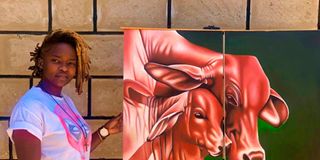Young painter aspires to be the Da Vinci of our time

What you need to know:
- Early this year, Fridah was approached by an organisation called Jesuit Conference of Africa and Madagascar (JCAM), to do a series of paintings for them.
- “The company was impressed with my work and they hosted a dinner in my honour, where I unveiled the paintings.
- "The works of art were eventually displayed tastefully at their offices, something that made me feel very proud. It was a real win for me. Oh, and they paid me well!” she says.
Fridah Ijai, 25, first realised she was an artist when she was in class five.
“During an art and craft lesson, my teacher was really impressed by what I had drawn. He took my work to the staffroom to show other teachers and called me to explain what I had drawn before the teachers. That incident sparked something in me. That was the day I realised I was talented,” she says.
Another incident she remembers is vividly watching her father sketch his car when she was a little girl.
“I started copying him by making my own sketches and he helped me do it. That was very exciting for me,” she says.
Today, besides being a painter, Fridah is a final year student at Kenyatta University studying a Bachelor’s degree in fine arts majoring in painting, interior design, and weaving.
“I specialise in realist painting which means I paint things the way they are, from observation. I look at an object and then I paint it the way it is. I am still trying to find my personal style which I think is somewhere between hyperrealism and realism,” she says.
What she paints depends on the needs of her clients.
“I listen to them, understand what they want and I give them a quick sketch of my understanding of what they are saying. After that we come to an agreement on how to proceed,” she says.
But Fridah also makes paintings which are not commissioned.
“If I am doing my own paintings, I draw inspiration from activities in my immediate environment. I try to capture interesting moments. For example, when I witness an incident I feel is important, I highlight it in my painting,” she says.
Early this year, Fridah was approached by an organisation called Jesuit Conference of Africa and Madagascar (JCAM), to do a series of paintings for them.
“The company was impressed with my work and they hosted a dinner in my honour, where I unveiled the paintings. The works of art were eventually displayed tastefully at their offices, something that made me feel very proud. It was a real win for me. Oh, and they paid me well!” she says.
She relies on Facebook and Instagram (Fridah_ijai) to reach more people. Additionally, she exhibits in galleries such as the Tazama Art Gallery in Karen and Karen Country club.
“I also go to pop up exhibitions such as malls where I showcase my work and encourage anyone who is passing to see and buy. The point of an exhibition is to show people what you have done. The more people see your work, the better chances you have of selling your work or getting commissioned for projects,” she says.
She decries the fact that in Kenya, most people are not informed when it comes to art. This means they do not understand the point of art or even why it costs money.
“That is why we end up with foreigners or sophisticated Kenyans as our primary target. The government can help by creating social awareness programmes to educate Kenyans about art so that they are able to appreciate it, and use art for social awareness,” she says.
Another challenge Fridah is grappling with is lack of studio space. She used to work from the studio at school. But with the curfew, this is no longer possible because of time spent on the commute to and from the studio. She now works from home, which she says is not the best because most of her clients want to see her other pieces, and also where she works from. Additionally, she says, art collectors, a key target population for her, cannot find her at home.
“I am working towards getting a studio once I graduate,” she says.
She has learnt that success in the arts requires patience, hard work and resilience. You cannot wake up and be the best.
“Art is hard work. You need to be consistent. Otherwise your art will die. I have also learnt that interacting with other artists is important because you get to not only learn from them but also to stay in the loop about what is happening in the industry,” she says.
Fridah advises budding artists to follow their passion because that is what will propel them to success.
“Focus on and stay motivated by your own work. When you are your own competition, you will always strive to do better,” she says.
She hopes to reach the global market with her art.
“I want to inspire and mentor other upcoming artists. I want to be the Da Vinci and Frida Kahlo of my generation,” she says.





